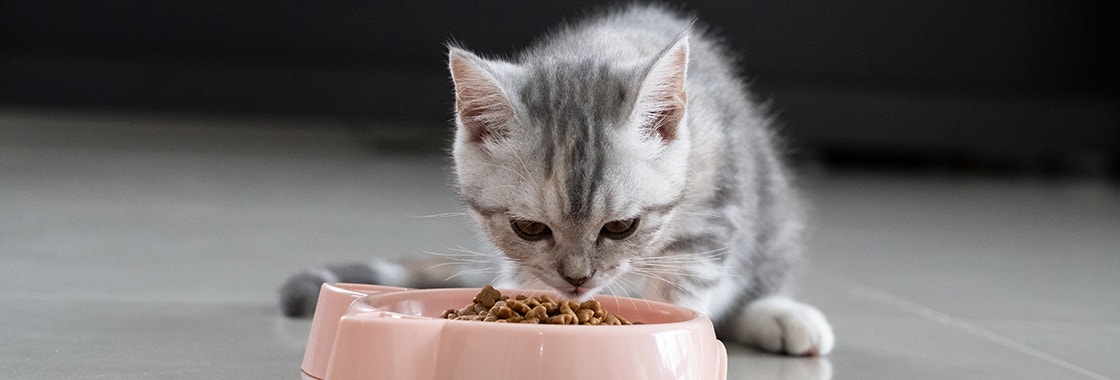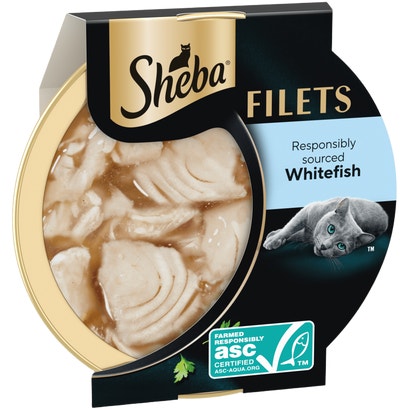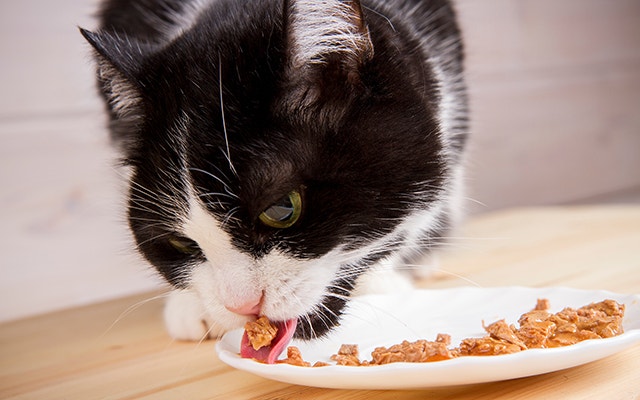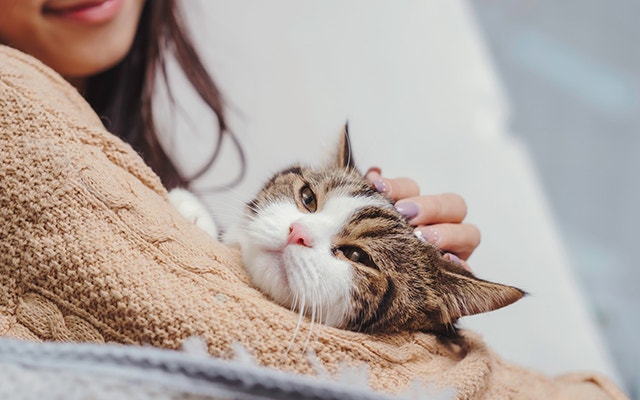Can kittens eat adult cat food?


Share
For many new cat owners, the question ‘can kittens eat adult cat food’ comes up quickly, especially when little paws sneak into the older cat’s bowl. While the occasional nibble isn’t usually harmful, it’s not ideal, especially in excess. Kittens need food specifically formulated for their healthy growth and development.
Adult cat food doesn’t provide the extra protein, fat, and calories or the vitamins and minerals in the correct amounts and ratios to fuel a kitten’s rapid growth. Feeding kitten adult food long-term can result in nutritional deficiencies, poor growth, and weaker immune defences. For the best start in life, feed a complete and balanced kitten diet to support developing bones, muscles, and brains from weaning until the kitten reaches 12 months of age.
Learn more about feeding a kitten and why kitten-specific nutrition is so important. While it’s tempting to let them share with older cats, their tiny bodies need tailored support, so reach for specially formulated kitten food until they’re ready for the next stage.
When do kittens start eating solid food?
If you’re wondering when kittens start eating solid food, most begin the weaning process around three to four weeks of age. At this stage, they start showing curiosity about solid food, particularly when they see their mother or siblings eating. Small baby teeth start to erupt through the gums, ready to handle soft, moistened foods.
Most kittens can transition entirely to solid meals by 8-10 weeks, such as wet kitten food or softened dry kibble. It’s essential to introduce solid food gradually, ensuring they still feed from mum or receive kitten milk replacer if needed. A gradual and slow introduction to new diets helps prevent digestive upset and encourages healthy eating habits.
Remember, even if the thought of kittens eating adult cat food crosses your mind during this phase, it’s better to stick with specially formulated, nutrient-dense kitten diets. They offer the right balance of nutrients critical for this sensitive growth stage. Maintaining consistency at this early stage is crucial, as cats rely on routine as they mature and enjoy several small meals, preferring to graze throughout the day.
What’s the difference between kitten and adult cat food?
When asking if kittens can eat adult cat food, it’s essential to understand why the two types of food are formulated so differently. Kittens are in a rapid growth phase, requiring extra energy, protein, and nutrients compared to fully grown cats.
Here’s a quick comparison between kitten food and adult cat food:
Nutrient | Kitten Food | Adult Cat Food |
Calories | Higher calorie content to fuel growth and activity. | Moderate calorie content to maintain adult weight. |
Protein & Fat | Elevated levels for muscle and tissue development. | Balanced to maintain body condition, not for growth. |
DHA | DHA (an omega-3 fatty acid) is critical for brain and vision development. | Less DHA, as adult cats no longer need it for development. |
Vitamins & Minerals | Extra calcium and phosphorus for strong bones and teeth. | Adjusted for adult maintenance, lower in some nutrients. |
While adult cat food meets the needs of fully grown cats, it lacks the concentrated nutrition essential for kittens’ early stages. Feeding kittens the right balance ensures they grow strong, healthy, and resilient, supporting physical growth and cognitive and sensory development.
Explore Sheba’s expert insights on nutritional needs across life stages to understand the difference between kitten and cat food. Always choose food specifically designed for your kitten’s health and vitality.
Is it safe if a kitten eats adult cat food occasionally?
Can kittens eat adult cat food occasionally? The reassuring answer is yes — a few bites from the older cat’s bowl won’t cause harm. However, while the occasional nibble is harmless, making it a regular habit can compromise your kitten’s health.
Because adult food lacks the high levels of protein, fat, and essential nutrients kittens need, consistent feeding can result in nutritional deficiencies. So, if you’re asking, “what happens if my kitten eats my older cat’s food” regularly, you may notice slower growth, weaker immunity, or digestive issues over time.
Keep a close eye on your kitten’s eating habits and ensure they primarily consume specially formulated food. If you’re concerned they’ve been overeating adult cat food, consult your vet for guidance to keep their diet on track.
When should kittens transition to adult cat food?
While the question can kittens eat adult cat food comes up often, the real focus should be on when they’re developmentally ready to make the switch. Most kittens are ready to transition around 12 months of age when their rapid growth slows, and their nutritional needs shift from building bone and muscle to maintaining a healthy weight and condition.
Some larger breeds, such as Maine Coons, may benefit from kitten food until 18 months, as they grow more slowly and require extra nutrients for longer. Transitioning too early can deprive your kitten of essential calories, protein, and fat, while transitioning too late can risk overfeeding and weight gain, as kitten food is calorie-dense.
Here’s a simple step-by-step guide to help transition your kitten safely from kitten to adult cat food:
- Days 1–2: Mix 75% kitten food with 25% adult cat food.
- Days 3–4: Adjust to a 50/50 split between kitten and adult food.
- Days 5–6: Move to 25% kitten and 75% adult food.
- Day 7 onwards: Offer 100% adult cat food.
Throughout this gradual process, keep a close eye on your kitten’s appetite, stool consistency, and overall behaviour. If you notice any digestive upset, such as soft stools or vomiting, it may be worth slowing the transition or consulting your vet for personalised advice.
It’s also important to remember that how often you feed your kitten matters as much as what you feed them. Younger kittens typically need more frequent, smaller meals to support their growth and energy needs.
If you’re wondering if kittens can eat adult cat food before the transition point, remember that while small tastes are unlikely to cause harm, their regular diet should meet their specific nutritional requirements for optimal health. For helpful guidance on portioning and mealtime routines, check out our complete guide on how often to feed a kitten.
What about 'all life stages' cat food?
Many cat owners ask whether kittens can eat adult cat food alternatives such as ‘all life stages’ formulas, and the good news is, these options are thoughtfully crafted to support both kittens and adults alike. Cat food labelled “for all life stages” is designed to meet the nutritional needs of both growing kittens and adult cats. This means it contains higher calories, protein, and essential nutrients that kittens need while supporting adult cats’ maintenance requirements.
All-life-stages cat food can simplify feeding in mixed-age households, but wherever possible, feed kittens and adults separately. This helps ensure each cat gets the right nutrients and portion sizes. Monitor your kitten’s growth and check with your vet to support healthy development.
Remember, when do kittens start eating food suited for their life stage? Typically between 3–4 weeks old during weaning. At this point, choosing the right balance of nutrients matters. If you’re unsure about what happens if my kitten eats my older cat’s food frequently or if kittens can eat adult cat food and find alternatives without missing vital nutrients, it’s always best to consult your vet for tailored advice.
Final tips for feeding kittens
Feeding kittens properly is about more than just asking, can kittens eat adult cat food — it’s about building lifelong healthy habits. Keep these key tips in mind for a happy, thriving kitten:
- Feed multiple small meals a day to meet their high energy needs.
- Always provide fresh water alongside their meals.
- Avoid giving cows milk, as many kittens are lactose intolerant.
- Monitor their weight and growth regularly to ensure they’re developing as expected.
- Consult a vet if you’re unsure when kittens start eating food like solids or need guidance on transitioning.
- If you’re wondering what happens if your kitten eats older cat food, watch for signs like diarrhoea, upset stomach, or slowed growth, and adjust their diet as needed.
Additionally, while occasional bites of adult cat food won’t harm them, consistently feeding a kitten an adult cat food diet can leave them short on critical nutrients. Prioritising proper kitten nutrition now sets the stage for long-term health and vitality.
Can kittens eat adult cat food - FAQ’s
Is it okay if my kitten eats my older cat's food?
An occasional nibble isn’t harmful, but what happens if my kitten eats my older cat’s food regularly is that they miss out on essential nutrients designed for kittens. To ensure proper growth and development, switch them back to a complete and balanced kitten food diet.
Is adult cat food too rich for kittens?
No, the issue isn’t that it’s too rich — it’s that adult cat food is tailored to meet the differing nutritional requirements of adult cats, not kittens. Although kittens can eat adult cat food from time to time, it shouldn’t replace their specially formulated meals.
Is there really a difference between kitten and adult cat food?
Yes — there’s a clear difference between kitten and adult cat food. If you’re asking, can kittens eat adult cat food regularly? The answer is no. Kitten food contains higher protein, fat, and the correct amounts, in the right ratios of all the essential nutrients to support growth, while adult cat food is formulated for maintenance, not development.
Can a kitten get diarrhoea from eating adult cat food?
Occasionally, yes. Can kittens eat adult cat food without side effects? Sometimes, if a kitten overeats adult cat food, it may upset their delicate stomach, leading to diarrhoea or nutritional imbalances. Always monitor your kitten’s reactions and consult your vet.











